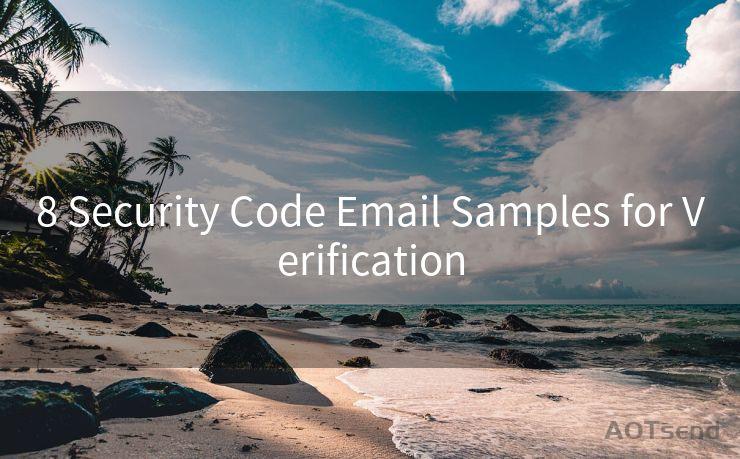8 Security Code Email Samples for Verification




When it comes to online security, verification codes sent via email play a crucial role. These codes add an extra layer of protection, ensuring that only the rightful owner of an account can access it. In this blog post, we'll explore eight samples of security code emails for verification, highlighting their key features and importance in today's digital landscape.
1. Standard Verification Code Email
This type of email typically includes a unique verification code, along with instructions on how to use it. The email might read: "Your verification code is: 123456. Please enter this code on the website to verify your account." Simple and straightforward, this email gets the job done efficiently.
2. Detailed Verification Instructions Email
Beyond just providing the code, this email offers step-by-step instructions on how to complete the verification process. For example: "Thank you for signing up! To verify your account, please enter the following code on our website: 123456. Click here for detailed instructions on how to complete your verification."
3. Welcome Email with Verification Code
This email serves as both a welcome message and a verification request. It might say: "Welcome to our platform! We're excited to have you. To activate your account, please verify your email address using the following code: 123456."
4. Multi-Factor Authentication Email
For added security, some services use multi-factor authentication. This email might read: "As part of our multi-factor authentication process, please enter the following verification code: 123456. This ensures that only you can access your account."
5. Account Recovery Verification Email
If a user forgets their password, a verification code can help them recover their account. The email might state: "To reset your password, please enter the following verification code on our website: 123456. This will help us confirm your identity and keep your account secure."
6. Transaction Verification Email
For financial transactions, a verification code adds an extra layer of security. The email may read: "To confirm your recent transaction, please enter this verification code: 123456. This helps us ensure the security of your funds."
7. Email Change Verification
When users change their email address, a verification code confirms the new address. The email might say: "To verify your new email address, please click here and enter the following code: 123456. This helps us ensure the security of your account information."

8. Mobile Number Verification Email
Similar to email verification, a code sent via email can be used to verify a user's mobile number. The email could read: "To verify your mobile number, please enter the following code on our mobile app: 123456. This helps us confirm your contact information and keep your account secure."
In conclusion, security code emails for verification are crucial for maintaining the security and integrity of online accounts. By providing a unique code, these emails ensure that only authorized users can access sensitive information or complete important transactions. As the digital world continues to evolve, these security measures become increasingly important in protecting our personal data and privacy.
🔔🔔🔔
【AOTsend Email API】:AOTsend is a Managed Email Service for sending transactional emails. Support Email Types: reminders, authentication, confirmations, notifications, verification codes, invoices, password resets, account activations, billing statements, two-factor authentication (2FA), and one-time passwords (OTP) emails, etc. $0.28 per 1000 Emails. 99% Delivery, 98% Inbox Rate.
You might be interested in:
Why did we start the AOTsend project, Brand Story?
What is a Managed Email API, How it Works?
Best 25+ Email Marketing Platforms (Authority,Keywords&Traffic Comparison)
Best 24+ Email Marketing Service (Price, Pros&Cons Comparison)
Email APIs vs SMTP: How they Works, Any Difference?




Scan the QR code to access on your mobile device.
Copyright notice: This article is published by AotSend. Reproduction requires attribution.
Article Link:https://www.mailwot.com/p769.html



